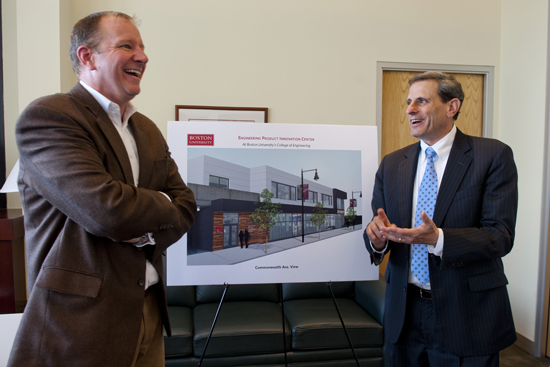New EPIC Studio Will Equip ENG Students with Design Skills
$18.8 million in-kind gift helps transform engineering curriculum

The Engineering Product Innovation Center (EPIC) will be housed in the former Guitar Center at 750 Commonwealth Ave. Courtesy of Wilson Architects
By many accounts, manufacturing is making a comeback in the United States. US manufacturers have added 500,000 new workers since the end of 2009, energy costs have dropped, and labor costs in competing countries such as China and India have been inching upward. President Barack Obama has been pushing to expand advanced manufacturing, most recently in his 2013 State of the Union address.
When those jobs materialize, BU College of Engineering graduates may well be among the first hired, thanks to Kenneth Lutchen, a professor of biomedical engineering and ENG dean, and to a $18.8 million in-kind gift of product design and lifecycle management software from PTC® that is currently used by about 27,000 manufacturers worldwide. Under Lutchen’s leadership, the college is transforming its curriculum so that all students, regardless of major, will graduate with a thorough understanding of how to develop new products, from concept and design through manufacturing and delivery. That knowledge will be nurtured in the new Engineering Product Innovation Center (EPIC), a 15,000-square-foot teaching and design studio equipped with the latest industry technology that will be housed in the former Guitar Center space at 750 Commonwealth Ave. While other schools have efforts to prepare engineering students for advanced manufacturing, says Lutchen, the ENG program is unique in how it will transform the entire engineering curriculum, enabled by modern technology and software infrastructure and through a partnership with regional industries.
“Not only is the concept exciting, but it’s going to create a new kind of engineer that really is excited and knows what’s involved in product creation,” Lutchen says. “This facility is meant to expose students to how you go from an idea to a manufacturing-ready and deployable product that you can make money with—and all the steps in between.”
Funded through the University, ENG alumni, and regional industry, EPIC will open around the middle of the fall semester. It will house a computer-aided design studio, demonstration areas, fabrication facilities, materials testing, and project management software. The facility will have a flexible design and offer students supply chain management software, 3-D printers, robotics, and laser processing.

“Wherever possible, things are going to be put on wheels,” says Gerald Fine, EPIC director and an ENG professor of the practice in the mechanical engineering department. “We’ll continually be looking to update and replace old equipment over the course of the life of the center.”
And while EPIC will be one of many learning spaces for engineering students, its opening signals a sea change for the college’s undergraduates. Starting with a small pilot program next spring, all sophomores will be able to take an engineering design course, and all students will have access to EPIC’s labs. Students will be trained in and use PTC Creo®, the company’s award-winning CAD software, and PTC Windchill® product lifecycle management software, which will integrate real-world processes, data, and business systems into the classroom.
The knowledge gained at EPIC is particularly valuable to a new generation of students who want to create products with a socially responsible eye. Lutchen, who has trademarked the phrase, calls them “societal engineers.” He says these up-and-comers must have a strong foundation in math and science and must be innovators, strong communicators, globally aware, and business-savvy.
“The societal engineer is someone who has a passion to embed all of those attributes with an engineering background to come out the other side as someone who holistically wants to improve society,” he says.
“A vast majority of our engineering students prefer to remain in New England after they graduate,” Fine says. “We think that we’re doing both our students and these companies a great service, and we’ve had a great response from area industries.”
“When I first heard from Dean Lutchen about the idea of EPIC, I was thrilled,” says Michael Campbell (ENG’94), executive vice president of PTC’s CAD segment, who will serve on EPIC’s advisory board. “I always felt that my engineering education lacked that real-world perspective, that real-world exposure to the challenges, processes, and complexities of collaboration and the sophistication of tools. Now we have a chance to share all of that with students.”
Comments & Discussion
Boston University moderates comments to facilitate an informed, substantive, civil conversation. Abusive, profane, self-promotional, misleading, incoherent or off-topic comments will be rejected. Moderators are staffed during regular business hours (EST) and can only accept comments written in English. Statistics or facts must include a citation or a link to the citation.